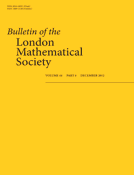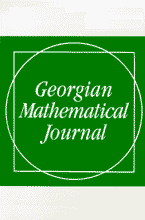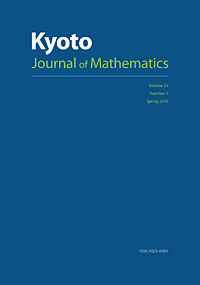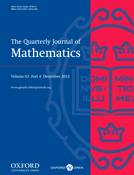
Banach Journal of Mathematical Analysis
Scope & Guideline
Catalyzing Progress in Algebraic and Analytic Methods
Introduction
Aims and Scopes
- Banach Space Theory:
The journal emphasizes the study of Banach spaces, their properties, and their applications across various branches of mathematics, including functional analysis and operator theory. - Operator Theory:
A significant focus is placed on the analysis of linear operators, including bounded, unbounded, and compact operators, as well as their spectral properties and applications. - Functional Analysis:
Research on functional spaces, including Sobolev spaces, Hardy spaces, and Lebesgue spaces, is prevalent, with an emphasis on the interplay between these spaces and various operators. - Interpolation Theory:
The journal includes studies on interpolation methods for operators and function spaces, exploring how properties are preserved under various transformations. - Stochastic Processes and Dynamical Systems:
There is a growing interest in the analysis of stochastic processes and dynamical systems within the context of Banach spaces, highlighting their relevance in modern mathematical analysis. - Noncommutative Geometry and Operator Algebras:
Research related to noncommutative geometry and various types of operator algebras, including C*-algebras and von Neumann algebras, forms a critical part of the journal's scope. - Applications in Mathematical Physics:
The journal also explores the applications of mathematical analysis in physics, particularly through the study of partial differential equations and quantum mechanics.
Trending and Emerging
- Operator Algebras and Noncommutative Analysis:
There is an increasing trend towards research in operator algebras, particularly C*-algebras and von Neumann algebras, highlighting their applications in both pure and applied mathematics. - Stochastic Analysis and Dynamical Systems:
The exploration of stochastic processes, particularly in the context of dynamical systems, is gaining traction, reflecting a broader interest in probabilistic methods in analysis. - Functional Spaces with Variable Exponents:
Research on variable exponent spaces, including their properties and applications, is emerging as a significant theme, indicating a shift towards more flexible functional frameworks. - Approximation Theory and Numerical Methods:
An increasing number of papers focus on approximation techniques and numerical methods within the context of functional analysis, showcasing the relevance of computational approaches. - Weighted Inequalities and Operator Theory:
The study of weighted inequalities for various operators is trending, as researchers explore their implications in different function spaces and their applications in harmonic analysis. - Higher-Dimensional Analysis and Geometry:
There is a growing interest in higher-dimensional analysis and geometric properties of function spaces, reflecting contemporary research directions in geometric functional analysis.
Declining or Waning
- Classical Analysis Techniques:
There seems to be a noticeable decline in classical techniques of analysis, such as those involving traditional techniques in real and complex analysis, as researchers are increasingly leaning towards more abstract and operator-theoretic methods. - Nonlinear Analysis:
Research related to nonlinear analysis, including methods and applications to nonlinear differential equations, has become less frequent, possibly due to a shift towards more linear and operator-based frameworks. - Geometric Functional Analysis:
Studies specifically focused on geometric aspects of functional analysis, while still present, are less pronounced compared to the growing emphasis on operator theory and abstract functional spaces. - Discrete Mathematics Applications:
The application of analysis to discrete mathematics has waned, as the journal seems to focus more on continuous systems and functional spaces rather than discrete structures. - Elementary Functional Analysis:
Papers covering foundational topics in functional analysis, which were once common, are now less frequent, indicating a potential shift toward more specialized and advanced topics.
Similar Journals

Complex Analysis and Operator Theory
Unveiling Insights in Complex AnalysisComplex Analysis and Operator Theory, published by Springer Basel AG, is a renowned journal in the field of applied and computational mathematics, reflecting a strong engagement with contemporary mathematical challenges. With an ISSN of 1661-8254 and E-ISSN 1661-8262, this journal provides a platform for disseminating significant findings and innovative methodologies that contribute to the advancement of complex analysis, operator theory, and their diverse applications. As a valuable resource for researchers and practitioners alike, it features high-quality peer-reviewed articles that rigorously explore both theoretical and practical aspects of mathematics. Although it currently does not offer open access, readers can access its insightful content through institutional subscriptions or individual purchases. Since its inception in 2007, the journal has carved a niche for itself, evidenced by its placement in the Q2 quartiles in both Applied Mathematics and Computational Mathematics, and its recognition in Computational Theory and Mathematics. With an ambitious goal to foster the dialogue between theory and practice, Complex Analysis and Operator Theory continues to support the mathematical community from its base in Basel, Switzerland.

Journal of Mathematical Analysis
Navigating the Landscape of Advanced MathematicsThe Journal of Mathematical Analysis, published by UNIV PRISHTINES in Serbia, offers a dedicated platform for the dissemination of innovative research in the fields of mathematical analysis and applied mathematics. With an ISSN of 2217-3412 and a convergence period from 2020 to 2024, this journal aims to foster significant advancements in both theoretical and practical aspects of mathematics. Categorized in the Q4 quartile for Analysis, Applied Mathematics, and miscellaneous Mathematics as of 2023, it serves as an essential resource for researchers and professionals alike, providing key insights into the evolving landscape of mathematical inquiry. Although it is an open access journal, facilitating global readership, its Scopus rankings reflect its emerging status, with rankings indicating a 51st percentile in Mathematics (miscellaneous) and 28th percentile in Applied Mathematics. This journal not only aims to contribute to academic discourse but also seeks to bridge gaps between mathematical theory and real-world applications, making it a vital resource for students and professionals engaged in the complexities of mathematical research.

BULLETIN OF THE LONDON MATHEMATICAL SOCIETY
Illuminating Trends in Mathematics for Over Fifty YearsThe BULLETIN OF THE LONDON MATHEMATICAL SOCIETY, published by Wiley, is a distinguished journal that serves as a vital resource in the field of mathematics. With its ISSN 0024-6093 and E-ISSN 1469-2120, this journal has consistently provided a platform for innovative research and scholarly discourse since its inception in 1969. Recognized for its quality, it currently holds an impressive Q1 ranking in the mathematics category, a testament to its significance in disseminating influential findings and trends in the mathematical sciences. Researchers and practitioners can rely on the BULLETIN for its comprehensive coverage of both theoretical and applied mathematics, which caters to a diverse audience ranging from professionals to students alike. Though it does not currently offer Open Access options, its articles can be accessed through institutional subscriptions, ensuring that significant works reach the academic community effectively. With contributions that span over five decades, the journal continues to shape mathematical research and inspire future advancements in the discipline.

Sahand Communications in Mathematical Analysis
Advancing mathematical insights for a global audience.Sahand Communications in Mathematical Analysis is a distinguished open-access journal published by the University of Maragheh in Iran, dedicated to the field of mathematical analysis and its applied branches. Since its inception in 2014, the journal has provided a valuable platform for researchers to disseminate significant findings in areas ranging from analytical methods to numerical analysis and applied mathematics. Despite its relatively recent establishment, the journal has quickly gained recognition, noted for its Q3 rankings in both Applied Mathematics and Numerical Analysis categories, and its Q4 ranking in Analysis for 2023. With an ambition to foster innovative research and facilitate scholarly dialogue, Sahand Communications in Mathematical Analysis aims to support the global mathematical community by ensuring unrestricted access to high-quality research outputs. Researchers, professionals, and students can look forward to engaging content that pushes the boundaries of mathematical inquiry through its open-access model, thus enhancing the accessibility and reach of critical mathematical discussions.

Pure and Applied Mathematics Quarterly
Pioneering Insights in Pure and Applied MathematicsPure and Applied Mathematics Quarterly is a prestigious journal published by INT PRESS BOSTON, INC, focusing on the diverse and evolving field of mathematics. Since its inception in 2007, this journal has grown significantly, currently holding a Q1 ranking in the Mathematics (Miscellaneous) category for 2023, positioning it among the leading publications in the discipline. With a commitment to publishing high-quality research, Pure and Applied Mathematics Quarterly fosters innovation and dialogue within the mathematical community by providing a platform for theoretical advancements and practical applications. The journal remains accessible to researchers and professionals through its ISSN 1558-8599 and E-ISSN 1558-8602, although it does not currently offer open access. As a vital resource for mathematicians, educators, and students, this journal endeavors to expand the frontiers of mathematical knowledge and contribute to the academic dialogue surrounding this fundamental science.

POSITIVITY
Elevating Knowledge in Theoretical DiscoursesPOSITIVITY is a distinguished journal published by Springer, focusing on cutting-edge research in the realms of Mathematics, Analysis, and Theoretical Computer Science. Since its inception in 1997, the journal has fostered intellectual rigor and innovation, catering to a diverse audience of researchers, professionals, and students alike. With an esteemed Q2 ranking in 2023 across multiple categories including General Mathematics, Analysis, and Theoretical Computer Science, POSITIVITY serves as a significant platform for disseminating high-impact findings that advance knowledge in these fields. Though it does not operate under an Open Access model, the journal provides critical insights that contribute to its commendable standing, reflected in its Scopus rankings, which highlight the journal's influence within the academic community. The ongoing publication until 2024 ensures that POSITIVITY remains at the forefront of mathematical discourse, making it an invaluable resource for those dedicated to pushing the boundaries of theoretical and applied mathematics.

Georgian Mathematical Journal
Championing excellence in mathematical exploration.Georgian Mathematical Journal, published by Walter de Gruyter GmbH, is a prestigious academic journal dedicated to the field of mathematics, particularly in its multifaceted applications and theoretical explorations. With an ISSN of 1072-947X and an E-ISSN of 1572-9176, this journal is indexed within notable databases and holds a strong position as evidenced by its Q2 ranking in the Mathematics (miscellaneous) category as of 2023 and a ranking of #140 out of 399 in the general mathematics Scopus category, placing it in the 65th percentile for research visibility. Since its inception in 1994, the journal has continued to evolve, aiming to foster innovative research and scholarly communication among mathematicians worldwide. Although it does not offer Open Access, the journal’s commitment to quality and rigor ensures that published works are of high relevance, appealing to researchers, educators, and students who are dedicated to advancing mathematical knowledge across diverse domains.

Kyoto Journal of Mathematics
Elevating mathematics: where innovation meets collaboration.Kyoto Journal of Mathematics is a premier academic publication dedicated to advancing the field of mathematics, published by DUKE UNIVERSITY PRESS. Established in 1996, this journal serves as a vital platform for sharing innovative research and breakthrough studies across various mathematical disciplines. The journal has consistently maintained a prestigious Q1 ranking in the category of Mathematics (miscellaneous) as of 2023, reflecting its significant impact and contribution to the mathematical community. With its Open Access policy, the Kyoto Journal of Mathematics ensures that groundbreaking research is easily accessible to a global audience, fostering collaboration and knowledge dissemination among researchers, professionals, and students alike. The journal's commitment to excellence and relevance in mathematical research is underscored by its extensive archive of published works and its continuous engagement with contemporary mathematical challenges. This makes the journal an essential resource for anyone seeking to stay abreast of current trends and advancements in the field.

ACTA SCIENTIARUM MATHEMATICARUM
Pioneering Insights into Applied MathematicsACTA SCIENTIARUM MATHEMATICARUM, published by SPRINGER BIRKHAUSER in Switzerland, is a distinguished journal focusing on the fields of mathematical analysis and applied mathematics. With an ISSN of 0001-6969 and an E-ISSN of 2064-8316, this journal serves as a critical platform for disseminating high-quality research that bridges theoretical and practical aspects of mathematics. Although currently categorized in the Q3 quartile for both Analysis and Applied Mathematics as of 2023, the journal strives to enhance its impact on the mathematical community by offering a perfect blend of rigorous research and innovative applications. Researchers, professionals, and students can benefit from the journal’s commitment to advancing knowledge in mathematics, despite the absence of open-access options. The mailing address for correspondences is 233 SPRING STREET, 6TH FLOOR, NEW YORK, NY 10013. As mathematics continues to evolve, ACTA SCIENTIARUM MATHEMATICARUM positions itself as a valuable resource for those looking to contribute to and stay informed about the latest developments in this vibrant field.

QUARTERLY JOURNAL OF MATHEMATICS
Advancing Mathematical Frontiers with Every IssueQuarterly Journal of Mathematics, published by Oxford University Press, stands as a pivotal resource for the mathematical community, focusing on a broad spectrum of topics in the field of mathematics. With its esteemed history dating back to 1930, this journal continues to foster innovative research and discussions, providing a platform for scholars to share their findings and insights. Although the journal currently holds a Q3 classification in mathematics (miscellaneous) and is ranked #207 among general mathematics publications in the Scopus database, its commitment to quality and rigorous peer review ensures that it remains relevant and insightful. Researchers, professionals, and students alike will find the Quarterly Journal of Mathematics an invaluable tool for advancing knowledge and understanding in various mathematical disciplines, making it an essential addition to any academic library.